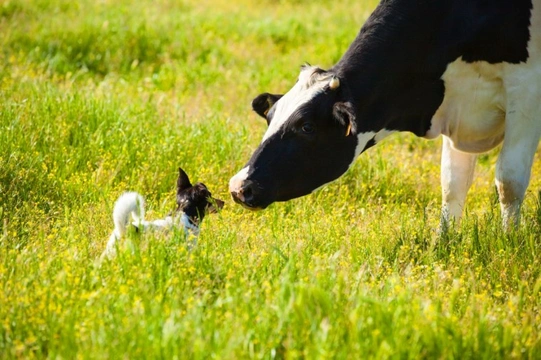
Are cow pats or cow muck dangerous to dogs?
Cow pats are something we give a wide berth when walking in the countryside, albeit they can be hard to avoid – and many dogs do the exact opposite and take a completely inexplicable interest in them, enjoying rolling in cow poop and even, if you’re really unlucky, eating it too.
This means that for the owners of dogs of this type, walking through cow fields can be a challenge, or mean an inevitable clean-up or bath is required for the dog later, but is that as bad as it gets, or are cow pats dangerous to dogs?
There isn’t really a simple yes or no answer to this; a worming product commonly used for livestock cows that can be present in cow pats can pose a danger to your dog, and this danger is low but serious.
For the vast majority of dogs that come into contact with cow pats, the worst that will happen is that they’ll earn a bath and a telling off – but this article will explain in more detail how cow pats can potentially be dangerous to dogs in a more acute manner. Read on to learn more.
Cow pats from wild cow populations that only eat grass and roughage and nothing else aren’t harmful to dogs
Cows that live in wild herds and that are not farmed, fed by humans, or otherwise have their natural lifestyles changed in any way produce cow pats that may contain parasitic worms, which can be passed onto dogs. However, the worming products you use for your dog will resolve these without them going on to cause any problems, and so pure natural cow muck in its pure, natural and stinky form is not a danger to your dog!
Cow pats from owned livestock cows may be harmful to dogs that eat it
For most dogs and dog owners in the UK, the cows you’re likely to cross over with when out on walks and the types of cow pats the canine population are likely to encounter and take an unhealthy interest in will be livestock, or farmed cows.
Whether they’re being farmed for milk, meat, or simply owned by a smallholding, livestock cows will almost certainly be treated regularly with a worming product, and for cows that produce meat or milk for the food chain, their treatment with products of this type is mandated by law.
There are a range of different worming products that can be used for cows, and as is the case for dogs, cow wormers come in a variety of different types with different brand names and active ingredients.
One of the most common wormers used for cows in the UK contains an active ingredient called Ivermectin, and while this is safe for cows, it is actually highly toxic to dogs.
When a cow (or a whole herd of cows) has been wormed, the worming product itself passes from the body into their cow pats, and this means that dogs that pay undue attention to cow pats may come into contact with it.
Ivermectin may be present in cow pats from livestock, and this is dangerous to dogs
Ivermectin may be present in cow pats produced by livestock as a side effect of their being wormed, which means then that cow pats can be dangerous to dogs, because Ivermectin is dangerous to dogs.
Ivermectin toxicity in dogs is a very serious condition that results in acute symptoms, and which can be fatal to dogs that develop it.
However, how dangerous it is to dogs depends on a range of things like how big your dog is, how much Ivermectin is present in the cow pat or cow muck in question, and what your dog does with it, as it were!
While Ivermectin poisoning in dogs from cow pats is serious if it occurs, it is also rare, and the odds of a dog getting Ivermectin poisoning due to contact with cow pats is low.
There is a low but serious risk of Ivermectin poisoning to dogs that eat cow pats
If your dog eats cow poo, the chances of them developing Ivermectin poisoning is rather higher. However, as mentioned, even if there is Ivermectin present in the poop your dog eats it may not affect them, depending on the concentration of it and the size of your dog and a range of other variables.
Most dogs that eat cow pats – and there are a large number of them around that do – do not come to any harm from doing so.
However, if it does develop, Ivermectin poisoning in dogs is serious, which is something all dog owners need to bear in mind if their dogs pay more attention to cow pats than you would wish them to.
Cow pats from owned livestock cows aren’t harmful to dogs that just roll in it
If your dog is the type that likes to roll around in cow pats but that doesn’t actually eat the cow muck, you might not exactly feel lucky, but on the plus side, they won’t be at risk of developing Ivermectin poisoning, even if Ivermectin is present in the poop in question.



